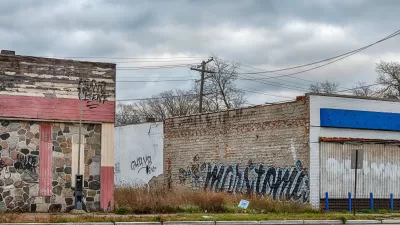Detroit's comeback has been well documented, as has its efforts to remove blight and demolish vacant properties. A new report sheds light on another of the city's deepest challenges: how to reform property taxes to achieve fiscal certainty.
"Detroit is still hindered in its recovery by structural flaws in its property tax system," according to a new report published by the Lincoln Institute of Land Policy.
A post on the Lincoln Institute's blog introduces the study, which details the multiple stresses on the city's fiscal system associated with property tax system, including high property tax rates, delinquencies, inaccurate assessments, overuse of tax breaks, and limitations imposed by the Michigan constitution and state statutes.
The report, titled Detroit and the Property Tax: Strategies to Improve Equity and Enhance Revenue and written by Gary Sands, Wayne State University professor emeritus of urban planning, also provides five suggestions for reforming Detroit's property tax system, which are informative for other post-industrial cities struggling to achieve fiscal balance. The reports suggested reforms:
- Continue to improve assessments
- Improve the targeting of tax abatements
- Implement a land-based tax
- Eliminate the state's taxable-value cap
- Reduce statutory tax rates
Christine MacDonald picked up the news of the report, providing coverage for The Detroit News. The article focuses mostly on the imbalance of tax breaks for businesses and the highest tax rates of any major city in the country for individual property owners.
FULL STORY: Detroit’s Property Tax: Averting Another Disaster

Planetizen Federal Action Tracker
A weekly monitor of how Trump’s orders and actions are impacting planners and planning in America.

Maui's Vacation Rental Debate Turns Ugly
Verbal attacks, misinformation campaigns and fistfights plague a high-stakes debate to convert thousands of vacation rentals into long-term housing.

San Francisco Suspends Traffic Calming Amidst Record Deaths
Citing “a challenging fiscal landscape,” the city will cease the program on the heels of 42 traffic deaths, including 24 pedestrians.

Amtrak Rolls Out New Orleans to Alabama “Mardi Gras” Train
The new service will operate morning and evening departures between Mobile and New Orleans.

The Subversive Car-Free Guide to Trump's Great American Road Trip
Car-free ways to access Chicagoland’s best tourist attractions.

San Antonio and Austin are Fusing Into one Massive Megaregion
The region spanning the two central Texas cities is growing fast, posing challenges for local infrastructure and water supplies.
Urban Design for Planners 1: Software Tools
This six-course series explores essential urban design concepts using open source software and equips planners with the tools they need to participate fully in the urban design process.
Planning for Universal Design
Learn the tools for implementing Universal Design in planning regulations.
Heyer Gruel & Associates PA
JM Goldson LLC
Custer County Colorado
City of Camden Redevelopment Agency
City of Astoria
Transportation Research & Education Center (TREC) at Portland State University
Jefferson Parish Government
Camden Redevelopment Agency
City of Claremont




























